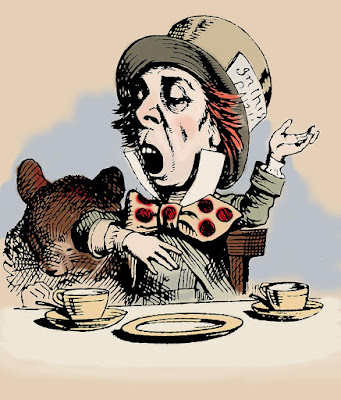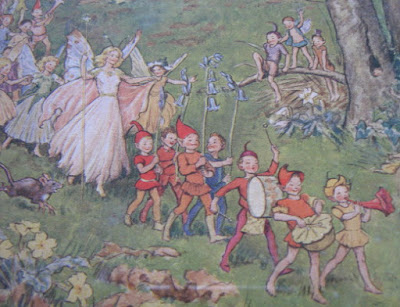Last Friday, The Girls and I gave a tea party.
In fact, in French it is more properly called un goûter (a snack you give children when they come back from school around five o'clock, or that adults eat either alone or together or as a party, also around five o'clock, with cake and coffee or other refreshment; tea is not the mandatory beverage). But for the sake of clarity, let us say we gave a tea party.
Friday is the day of important shopping
for the week to come. The Shopping Lady comes for two hours and takes The
Girls, with my shopping list. She comes again on Tuesday, but it is
more for the sake of buying magazines, fresh baguettes, meat and
fish, milk and the things that were either forgotten on the previous Friday or are now missing.
But after the shopping, if my Shoppers
hurry a little, there is still time left for other activities.
Some time ago, there was quite a discussion
about the merits of an almond cake that The Shopping-cum-Cleaning Lady in
Training (remember the S-c-C-i-T?) had baked according to a new recipe, and its
compatibility with tea from a great French House of Teas in Paris, which I was
making them taste.
I have to say that the tea we find in
French supermarkets and use to make tea is close to washing up water. It comes
in teabags and is mostly flavoured - fortunately! Without being flavoured, it
is... Better not attempt to qualify it. Well, France has never been a country for tea. It is a country for
coffee, good strong coffee, rather Italian-like. Nevertheless, with the influx
of British expats and tourists, most of our supermarkets in la Dordogne have
part of an aisle dedicated to Anglo-Saxon products, among which at least two
brands of tea. But they are of course much more expensive. So the French mostly
stand staunchly by their washing-up water tea.
During winter, I brewed some British tea from the
supermarket for The Shopping Lady to show her there was a difference and it was
really worthwhile buying something more expensive when I requested a special
brand of tea on my shopping list. She discovered I was
right and she loved good tea. The next time, I tried loose leaf tea from this
Paris House of Tea and she delighted in it. The week after was one of the first
of the Lady in Training who joined the Shopping Lady in tasting another tea
from the same House. And she discussed her almond cake.
This is how the Lady in Training decided there and then that she would bake another cake that we would eat all together after a shopping session. The Shopping Lady said she would provide les oeufs fermiers de sa cousine (the eggs from the farm belonging to her cousin), and I said I would provide another tea.
There were delays with colds,
bronchitis, the Lady in Training's schooling part of her training, holidays,
and other impedimenta, but it was finally decided that the goûter/tea
party would take place last Friday.
While The Ladies and The Girls were out
shopping, I set the table with care
and felt like a kind of tea seller with my tea caddy and its various containers
of loose leaves! But I don't know who was happier from The Girls or The Ladies,
to come back, let down the shopping bags, wash hands and sit down round the
table. The Lady in Training had baked a perfect cake, golden brown and tasting
delicately of almond; everybody chose the same tea; the tea cosy was something
of a curiosity; but soon there was only the shushed clink of cutlery and
china, the hushed noise of gentle chat, and the gurgle of the kettle to refill
the teapot.
Of course, amidst this very civilised
occasion, I could not but think with a smile and some nostalgia of the tea parties Mother had held in
her time, or the tea parties of older days when I was a child and even before, as
they were told to me. And I thought of the mad tea party in "Alice in
Wonderland".
The latter was uppermost in my mind, as
a friend and I talked at some length some time ago about our childhood books,
about Alice and about a film ("Dreamchild") he recommended to me.
I have always been frightened by "Alice
in Wonderland". I guess I was already too rational for fairy tales and nonsense
tales. I was told Alice as a bedtime story and was scared by the very
beginning: how could someone disappear in a hole in the earth and then change
from being over-tall to over-tiny by drinking and eating? How could one chat with a caterpillar that was obviously completely drugged and talked nonsense? How could babies turn into piglets? How could
kings and queens be so dumb and frightening? What was this story where rabbits
had fobs and animals were so extraordinary as to talk and make daft things? What about a cat that disappeared leaving behind it his large grin? And
what about this mad tea party?
It was more than a nonsense tale for me
("Le Petit Prince" by Saint-Exupéry was enough of that); it was a
nightmarish tale. Add to it my fear of my teddy bear and you will have the
perfect image of the dreaded bedtime I lived every night. I guess the illustrations by Tenniel were another trigger for my terror.
It took me years to be reconciled with
Alice. I read comments, exegesis, paratextes
or metatextes about the books, and
then - then only - I could go back to the text as to any text and rationalise
it. I am aware that I must have lost much of its immediate poetry. My friend
reminded me that it was a tale told on a sunny afternoon to children to amuse
and not to frighten them. The film of which he gives me the link for a long
trailer shows all this:
Dreamchild - extract
38 minutes
And yet, when I look at the March Hare with his yellowing teeth, and the poor dormouse, or the Mock Turtle and the Gryphon, I still feel the hair on my neck bristling.
This led me to think about children's book in Britain and France (my Anglo-Saxon friends all told me that "Alice" was a delightful book - well books, with "Through the Looking Glass"-, and that they revelled in both and rather wanted to meet the characters), and British and French mythologies.
To talk of both would take too long for such a blog but it seems that there are less fairies and elves and "little people" in French tales and myths, unless it is in Brittany - but Brittany is a Celtic country. The French are more at ease with the solar Greek and Latin/Roman myths, their gods, goddesses and minor divinities. The Gallic roots (I mean the roots of the Gauls) have been slowly erased by the Roman civilisation, itself carrying Greek traditions. The invasions from the East and North (Vandals, Visigoths, Franks et al.) did nothing to rekindle the Celtic ground. Christianity had come over the Roman gods. By the end of the fifth century, the core of what would become the Realm of France was officially Christian with the christening of the Frank King Clovis. A breach of civilisation was irredeemably dug between France and Britain.
Meanwhile, oblivious of all these more or less idle considerations, our tea party was a very reasonable one, not mad at all but greatly enjoyed. "Alice" was in my sole and only mind. Thus we all said we would make another occasion soon: so many cakes to bake and so many brands of tea to taste!
Would we be on our way to seal the breach between "two nations" by way of tea parties?



























No comments:
Post a Comment